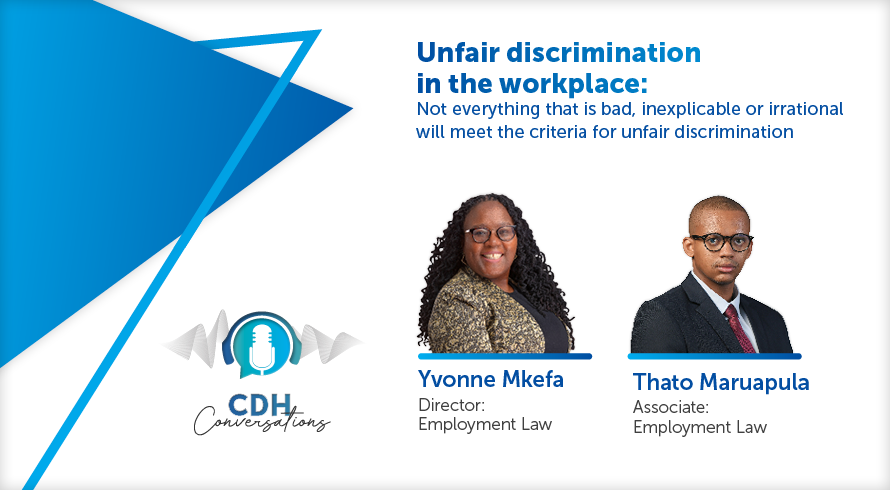Conundrum of nominee directors: The tug of war relating to fiduciary duties owed to the two masters
At a glance
- Nominee directors are commonly appointed in South African businesses to protect the interests of specific shareholders or stakeholders. However, there is no statutory definition of a "nominee director" in the Companies Act.
- Nominee directors must navigate the challenge of balancing the interests of their nominators with their fiduciary duties to the company. They are legally obligated to prioritize the company's interests, even though they may represent the interests of their nominators.
- Directors, including nominee directors, owe the same fiduciary duties to the company and must exercise independent judgment in the best interests of the company. They should avoid conflicts of interest and act in the best interest of subsidiaries when serving on their boards.
It is important to note that despite the appointment of nominee directors being an entrenched commercial practice, there is no statutory definition of a “nominee director” in the South African Companies Act.
The mechanism of appointing a nominated director is used by various types of stakeholders, including shareholders, creditors, financial institutions and private or public investors such as the Public Investment Corporation. For instance, a private equity fund seeking to provide funding to an investee company may elect to nominate a director who will protect its investments to ensure that funds are used for the intended purpose and that the business meets certain defined targets. Additionally, within large group companies or multinationals, it is customary to have nominee directors appointed to the board of the various subsidiaries.
It is common cause that nominee directors often find themselves on a collision course of having to strike a balance between representing the interests of their nominators and executing fiduciary duties owed to the company, thus entailing the serving of two masters, which is legally permissible. However, conflict may arise when the interests of the two masters coincide and, as a result, the duty to act in the best interest of the company might seem to be “artificial”.
In an attempt to put an end to the conundrum faced by nominee directors, the judgment in Fisheries Development Corporation of SA Ltd v Jorgensen; Fisheries Development of Corporation of SA Ltd v AWJ Investments (Pty) Ltd is of utmost importance. The court emphasised the common law position that even though nominee directors may be representing the interests of their nominators, they remain legally obliged to serve and prioritise the interests of the company.
Accordingly is clear that the overarching principle in our law is that, whether they are designated as “nominee”, “executive” or “non-executive”, all directors owe the same fiduciary duties to the company and in discharging those duties, directors ought at all times to exercise independent judgement and act in the best interests of the company in the decision at hand.
Furthermore, directors are at all times expected to avoid situations that pose a direct or indirect interest that conflicts with those of the company, and this is confirmed in section 76(2)(a) of the Companies Act, which expressly prohibits directors from using their position to gain personal advantage or in favour of another (including their nominators) at the expense of the company or knowingly cause harm to the company or its subsidiary.
In the case of nominee directors appointed on the board of a subsidiary, conflict may arise, for instance, with inter-company loans that may be in the interest of the group or holding company but prejudicial to the subsidiary. Considering that subsidiaries are separate juristic entities, nominee directors serving on the board ought to act also in the best interest of the subsidiary and not the group.
This issue is recognised in terms of section 75 of the Companies Act, specifically in the context of intra-group transactions which involve common directors. For instance, if the holding company issues a guarantee for a loan to be advanced to its subsidiary, common directors on the board of the holding company are not permitted to vote in respect of any resolution to authorise the financial assistance, as section 75 requires conflicted directors to recuse themselves from a board meeting whenever a person “related” to them (in this case, the subsidiary company) has a material personal financial interest in the matter to be considered at the meeting.
In conclusion, directors are reminded that their prerogative is to observe the utmost good faith in executing their overarching fiduciary duties owed to the company and that the loyalty observed by nominee directors towards their nominators has limitations in law.
The information and material published on this website is provided for general purposes only and does not constitute legal advice. We make every effort to ensure that the content is updated regularly and to offer the most current and accurate information. Please consult one of our lawyers on any specific legal problem or matter. We accept no responsibility for any loss or damage, whether direct or consequential, which may arise from reliance on the information contained in these pages. Please refer to our full terms and conditions. Copyright © 2026 Cliffe Dekker Hofmeyr. All rights reserved. For permission to reproduce an article or publication, please contact us cliffedekkerhofmeyr@cdhlegal.com.
Subscribe
We support our clients’ strategic and operational needs by offering innovative, integrated and high quality thought leadership. To stay up to date on the latest legal developments that may potentially impact your business, subscribe to our alerts, seminar and webinar invitations.
Subscribe




